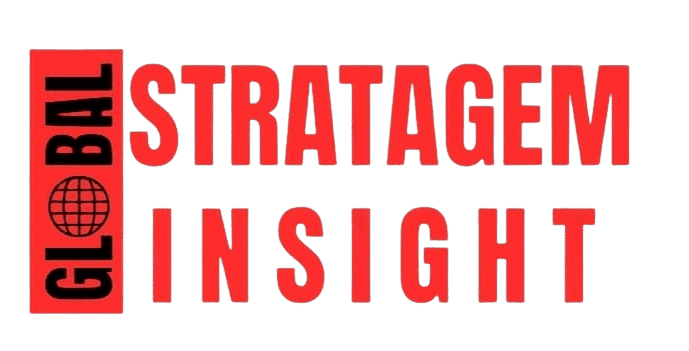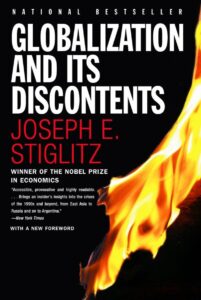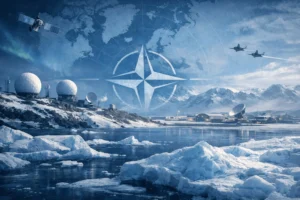Changing World Security Paradigm and policy Options for Pakistan

An illustration reflecting the shifting global security order, where military power, economic growth, and strategic decisions converge.
This study will explore policy options for Pakistan in the transiting world security paradigm. The world security paradigm is undergoing some significant changes due to the power shifting between global powers, and world order is gradually shifting toward multipolarity. This shift resulted into posing both traditional and non-traditional threat to Pakistan at four different levels. This paper provides analysis of these challenges and concluded with providing policy options for Pakistan which stress that Pakistan needs comprehensive and flexible policy and balance diplomatic approach to navigate these complex threats.
The term “security” has broader dimensions, and the idea of security has its origination in human existence. The world security paradigm indicates an approach to tackle security challenges globally. It consists of plans, measures, strategies and objectives that states and international organizations such as the UN and NATO certify to take the security measures for the survival of the state.
If we look at the back of history the security paradigm was primarily reliant on conventional military threats between the states. However, this paradigm has shifted from conventional warfare to hybrid warfare involving traditional security as well as non-traditional security. It encompasses broader dimensions of security concerns and priorities. This transformation and evolution of security is driven by various non-state actors, due to the development, advent of globalization, transnational threats and a greater stress upon human security and the environment. During the cold war there were only two superpowers, the USA and USSR, and in this context, security was defined as ‘national security’ in terms of empowering military weapons and power to maintain the balance of power in the bipolar system.
As we move forward in the era of globalization and complex interdependence, this paradigm addresses non-traditional security threats such as pandemic, cyber warfare, climate change, terrorism and mass migration.
The global security paradigm highlights the inter-linked and worldwide nature of security concerns, by making allies with the other states. Nations collaborate with the other states; they have the participation in international organizations and have strong diplomacy with the other nations to counter the security concerns. Because the world has now shifted from a bipolar world to a multipolar in which multiple powers are emerging.
How These Transition Impact Pakistan?
Now, keeping in view Pakistan’s security paradigm it faces 4 dimensions of security threat, include Global, Regional, Neighbourhood and Domestic threats. At Global level Pakistan faces food and energy security threat due to Russia-Ukraine war as Pakistan import grain form Ukraine and due to Russian OPEC+ status a hike in price of oil and gas is happened in international market which direct impacted Pakistan.
Secondly the US-China strategic competition and declaring China as their major rivals in the recent President Biden National Security Strategy (NSS-2022) shows that now US is officially declared China as their rivals. This contention has both economic and security implication for Pakistan has As US is strengthening India military capabilities through strategic partnership with India like BECA, and 123 Nuclear deal. Such partnership resulted into security dilemma as due to acquire of advance technology by Delhi, Islamabad is unintentionally dragging into arm race with India and both states spends very huge amount on defence instead of spending in education and other social welfare sector.
At Reginal level the Middle East crisis have direct impact on Pakistan due to religious, cultural, historical and ideological linkage between Pakistan and Middle East states. In past due the Saudi-Iran rivalry, sectarian tension erupted in Pakistan and the Sunni Shia conflict in Karachi, KPK and Gilgit Baltistan was resulted of the rivalry. The recent Hamas-Israel conflict has also impact Pakistan due to the ideological connection between Pakistan and Palestine.
Third aspect involves the neighboring issues which revolve around the Kashmir issue, and as in past both states fought war for Kashmir but after acquiring of Nuke many major clashes are observed between India and Pakistan that why this region is called as second nuclear flash point. In addition to that there is also re-emergence of the TTP in Afghanistan leading to the spillover effects in Pakistan, which is a big major security concern for Pakistan as many terrorists’ organization like TTP and ISKP are based in Afghanistan and using their soil to target both military and civilian especially in FDI project lead by China in Pakistan.
Lastly the Domestic level threat, includes immense and vast rise of extremism and terrorism in KPK and Baluchistan which involves TTP, BLA and ISKP which targeting law enforce and chinses acids (CPEC) inside Pakistan. On the other hand, India waging hybrid warfare to exploit the socio-political division and also to polarize the society through propaganda and information tools.
Problem Statement
A thorough review of Pakistan’s security paradigm and available options is required in order to address the complex difficulties that the security landscape in transitory environments provides to the nation. It is essential to examine the potential risks and opportunities for Pakistan in order to successfully navigate its security strategy in light of recent global developments like the Russia-Ukraine conflict, the Taliban’s ascent to power in Afghanistan, the warming relations between Saudi Arabia and Iran, and the still-active US-China rivalry. This article seeks to analyze the effects of these dramatic geopolitical developments and offer suggestions for Pakistan’s protection of stability and interests in the face of a rapidly shifting global environment.
Literature Review:
While gathering the data the qualitative and secondly data is used but at the same time some primary source like government document for instance the recent National Security Policy 2022-2026 is also used in gathering the data. The other secondary sources used to gather data are books which is “Pakistan Foreign Policy Choices in Post 9/11 Period: Options and Challenges” by Muhammad Ahmad and Rehana Saeed Hashmi”. This book explores both challenges and opportunities for Pakistan in the post 9/11 period and stress to make a balance foreign policy approach. In addition to data is also gathered form research paper like” Rethinking Regional Security Paradigm: Non-Traditional Security Threats and the Role of Regional Dialogue in South Asia” by Dr. Summar Iqbal Babar.
Challenges
In the constantly advancing world security worldview, Pakistan faces huge difficulties with regards to the enabled Afghan Taliban, pressures among Russia and Ukraine, and the complicated elements between the US and China. These difficulties have sweeping ramifications for Pakistan’s security and strength.
The ascent of the Afghan Taliban following the withdrawal of U.S. troops from Afghanistan has strengthened worries for Pakistan. With the permeable line and authentic ties with Afghan Pashtun gatherings, Pakistan has been wrestling with cross-line exercises, including illegal intimidation and medication dealing. The strengthening of the Taliban in Afghanistan can possibly encourage radical components inside Pakistan and worsen homegrown security challenges.
The mass movement of Afghan exiles into Pakistan is another major problem. It overwhelms the nation’s assets and framework, influencing both social administrations and financial security. Overseeing such an enormous convergence of evacuees is an impressive errand for Pakistan and the global local area’s help is vital in tending to this philanthropic emergency.
The Russia-Ukraine struggle represents its own arrangement of difficulties for Pakistan. As the two states are significant energy suppliers for Pakistan, any disturbance in energy supplies from Russia or wheat supplies from Ukraine could have extreme ramifications for the country’s energy security and food security. Pakistan’s reliance on Russian oil and Ukrainian wheat makes it powerless against international pressures and production network interruptions.
The contention between the US and China further confuses Pakistan’s security scene. The continuous exchange battle between these superpowers can have gradually expanding influences on the worldwide economy, including Pakistan’s. Moreover, the improvement of the Indo-Pacific Technique by the US and China’s aggressive Belt and Street Drive (BRI) and China-Pakistan Monetary Hallway (CPEC) shape the international elements in the district.
Besides, improvements in the Indian Sea are likewise an issue of worry for Pakistan’s security. The sea space assumes a crucial part in the international affairs of the locale, and the presence of significant powers like China in Gwadar Port and the U.S. in the more extensive Indo-Pacific brings up issues about Pakistan’s job and situation.
With regards to Pakistan, the Copenhagen School assists with understanding what the impacting scene security worldview means for the country’s security insights and activities. It reveals insight into how customary and contemporary security dangers are seen and developed by the state and different entertainers in the locale.
Analysis:
The analysis examines the impacting scene security worldview with regards to Pakistan’s security difficulties and potential approach reactions. It considers the historical advancement of security from conventional to hybrid fighting, enveloping traditional and non-traditional dangers. The investigation features how worldwide turns of events, for example, the Russia-Ukraine struggle, the ascent of the Afghan Taliban, and the US-China contention, influence Pakistan’s security scene.
The changing security worldview requires a complete way to deal with security, underscoring cooperation with different countries, support in worldwide associations, and solid strategy. Pakistan’s fragile situation between the US and China requires a decent international strategy to protect its public advantages.
The system distinguishes key security challenges faced by Pakistan, including cross-line psychological oppression, mass movement of Afghan refugees, and weaknesses in energy and food security because of international strains. The Indian Sea advancements and oceanic elements add to the complexity of Pakistan’s security concerns.
To address these difficulties, the examination suggests explicit strategy choices. These incorporate arrangements to battle environmental change, counter deception and digital impact, forestall psychological warfare and radicalism, and improve financial strength. Reinforcing organizations and insight capacities are significant for guaranteeing equity, harmony, and solid administration.
The Copenhagen School features how the ascent of the Afghan Taliban and radical components in Afghanistan impacts Pakistan’s essential reactions and counter-psychological warfare approaches. It underscores the securitization cycles, language, and talk in forming Pakistan’s security discernments towards cross-line psychological oppression, mass movement, and its cooperation with the US, China, and India. Local security buildings influence Pakistan’s approaches with regards to the Russia-Ukraine struggle and pressures between Saudi Arabia and Iran.
The examination stresses local participation, conciliatory endeavors, and foresighted arrangements as fundamental parts in really countering security challenges. By taking on these suggestions and turning into a responsible stakeholder in the transient world, Pakistan can explore the developing security worldview effectively and safeguard its dependability and interests on the worldwide stage.
Conclusion and Recommendations:
To certify security, stability, and sustainable development in a changing global landscape, Pakistan can originate an extensive framework to encounter Traditional and Non-traditional threats by implementing on the way forward stated below:
Misinformation and Cyber Influence:
To ensure public trust and national stability, new options must be formulated in order to eradicate misinformation. Therefore, media literacy programs and public awareness programs ease a lot and way forwards related to wireless communication, digital signatures, and General Data Protection Regulation must be introduced in Pakistan to give individuals more control over their data.
Counter-Terrorism and Extremism:
Efforts for this recommendation include the implementation of the Preventing and Countering Violent Extremism Programs (PCVE), which must be introduced in Pakistan and includes online radicalization, strategic communication, youth empowerment, to implement Action plans, and mental health Strategies to support this program and work with international stakeholders to counter terrorist.
To prevent Illegal Border Activities:
To encounter Illegal Border Activities, irregular movement across the border must be minimized. In order to achieve this, Pakistan should promote more stability, education, and employment opportunities. Regional cooperation should also be maximized, to engage in collaborative efforts to address issues like terrorism and climate change. These recommendations are in IOM Migration’s Framework program that should be introduced in Pakistan to encounter Illegal Border activities.
Socio-Economic Resilience:
Pakistan can bolster its socio-economic resilience by adopting options like prioritizing socio-economic development and adopting inclusive policies. However, the government can enhance marginalized communities and ensure opportunities for their socio-economic progress. In addition to this, maintaining quality education, healthcare, and infrastructure projects can ensure long-term stability and decrease the potential for radicalization and extremism.
Strengthen the Institutions:
As we know, Justice, peace, and Strong Institutions are much needed in Pakistan to eradicate Private Interest over Public interest, introduce the Rule of Law in the country, promote peaceful societies, and enhance sustainable development. However, options like the implementation of the rule of law and equal access to justice, the reduction of corruption and bribery, and the elimination of interference between Institutions must be introduced in Pakistan in order to build strong morals that are essential in a democratic country.
Strengthening Intelligence:
Nowadays, this recommendation is crucial as it prevents potential threats like cyber-attacks and identifies hostiles beforehand. Firstly, a comprehensive Policy must be formulated to develop AI standards that can be the basis of a common understanding of how to measure trustworthy AI and ethical use of AI. Also, other options, like the development of the AI industry, that include levels of Government Funding, measures to encounter AI impact on future work, measures to increase access to data for AI, and policies for international corporations like the development of AI standards, must be introduced.
Options for Mass Migration and Afghan Taliban Empowerment:
Border controls and Humanitarian Assistance needs to be strengthened in order to manage the influx of Afghan refugees. Moreover, fostering diplomatic efforts to support a stable government in Afghanistan can also minimize the spillover effects in Pakistan.
To encounter the Challenges related to Food security and Energy security:
By implementing sustainable practices in Agriculture and to improve the technology so that quality of food can be produced which leads to reduction of imports. Also, if we diversify energy resources, encourage energy conservation and invest in more renewable energy projects to enhance energy security.
Options for Russia(oil) and Ukraine (Wheat) for Pakistan:
To promote regional stability and economic interdependence, increase in the Trade agreements with Russia and Ukraine to fulfill the food and energy needs of Pakistan will ease a lot.
Options for US-China Trade War development:
To balance the relations with China and the US, it is compulsory to maintain economic ties. Also, by enhancing regional cooperation with neighboring countries in the Indian Ocean will promote sustainability and economic development.
Options for BRI-CPEC of China:
This includes options like nurturing close diplomatic ties with China, while maintaining the relations with other countries. To strengthen the CPEC, by enhancing connectivity and economic growth in the region.
Climate change:
The impact of climate change includes extreme water conditions, water scarcity, being prepared for disasters, and conservation of water. To confront climate change, options like support in National Infrastructure that can secure the health and safety of our nation, to introduce the use of electric vehicles or to minimize the use of vehicles. To set local emission goals that guarantee a clean environment, to increase small agricultural practices to reduce the greenhouse effect, and to ensure the recycling of food right away to prevent the wastage of food.
In a nutshell, the Transit World Security Paradigm provides both challenges and opportunities in Pakistan. In addition to this, fostering Regional Corporation and diplomatic efforts will be crucial in decreasing the threats. Through collaborative efforts and foresighted policies, Pakistan can encounter these security challenges effectively and will be able to emerge as a responsible stakeholder in the transit world.



